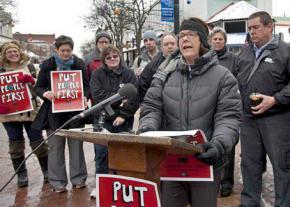Bus drivers are ready to walk
and report on the struggle by bus drivers in Northern Vermont for decent wages and working conditions--and the safety of their passengers.
NORTHERN VERMONT bus drivers are set to go on strike March 10, after management stonewalled through months of negotiations.
Chittenden County Transportation Authority (CCTA) drivers, members of Teamsters Local 597, are in a long-term battle over extended and unsafe work schedules, the expansion of part-time drivers, and constant surveillance and harassment. In February, the drivers voted overwhelmingly--by 53-to-4 margin--to reject management's "last, best offer."
The attitude of bosses toward the concerns raised by drivers about health and safety is that the drivers are there to drive, not to run the company. Workers who do raise their voices are concerned about the company's response, since disciplinary measures are regularly used to intimidate them.
In a practice that would make the National Security Agency and Walmart proud, supervisors pull surveillance tapes from random buses each day without cause in order to comb through them for infractions that allow them to write up and discipline drivers. A veteran driver nearing retirement said that he's anxious every time he returns the bus at the end of his shift, fearing disciplinary action. And he's not alone. Many drivers report a continual stream of arbitrary disciplinary abuse from supervisors.

The company's predatory management has drivers fearing for their jobs and their family's livelihood. Their stories are heart-wrenching--and infuriating. CCTA has a reputation in the industry as an especially hostile workplace, completely out of sync with its slick marketing image as a public transportation provider.
Management is taking a line that will be familiar to besieged public-sector workers elsewhere: scapegoating. CCTA advertises that driver pay is above average compared to the rest of northern New England, neglecting to mention that metro Burlington area living costs are among the highest in the region.
CCTA management also claims that it's only interested in providing a high-quality workplace, and safe and effective public transit. Everything it does toward its workers, however, shows the opposite.
CCTA's schedule runs on split shifts, forcing drivers to work several hours in the morning and then again several hours in the evening, with about five hours of unpaid time in between. For drivers who live outside of Burlington, there isn't enough time to go home--they often choose to sleep in their cars to make sure they're reasonably well rested for their evening shift.
Management's demand to increase the time spread in the split shifts flies in the face of the professional experience of drivers, who know that their working conditions impact the public's safety. During a press conference, driver Rob Slingerland pointed out that the majority of accidents involving CCTA buses are a result of driver fatigue.
Management's proposed split shift change is only allowable due to a flaw in Vermont State Law exempting municipal drivers from national standards. The law was intended for firefighters responding to an emergency, not drivers on scheduled public transit routes.
Management, in line with speedups imposed on workers in many industries, is not only trying to increase the length of the workday; it also wants to increase its intensity. CCTA is creating tighter route schedules and allowing fewer breaks for the drivers. Several drivers have reported urinating on themselves because they were unable to take a bathroom break.
Despite the fact that it has been consistently shorting full-time workers--and then demanding cash back from employees to cover health care premium costs when their hours fall short--management is insisting on provisions that will allow them to hire more part-time workers.
Like most part-time work, these jobs don't come with any benefits, and they will take 35 hours a week from the full-time drivers. Slingerland argues, "If we allow part-time workers in now, the company will expand the use of part-time labor next time around. This is about protecting a 40-hour work week."
THE ANGER and resolve of the drivers has roots in years of management dysfunction. Mike Walker was involved in intense negotiations with the company several years ago, when the drivers were just hours away from a strike. "Once the news crews left, they went right back to same old business as usual," he said. "They fooled us once, they're not going to fool us twice."
After the months of insincere contract negotiations, and after failing to abide by the last contract, management is showing no recognition of drivers' right to a union and collective bargaining. CCTA even wants its memos, for example, to override contract language on wages, hours and working conditions.
The drivers are not only fighting for their union's ability to defend livable jobs, but also to defend a safe and environmentally responsible mass transit system.
Fortunately, the bus drivers aren't alone. CCTA buses serve students and low-income workers with no other means of transportation. Thus, the drivers' demands resonate deeply in the community. Drivers, riders and Vermont residents are mobilizing for a solidarity campaign to fight for livable jobs and make sure that CCTA management's attempts at intimidation don't work.
As successful transit workers and public school teachers strikes have demonstrated, success rides on education and reaching out to the riders and workers who depend on the bus drivers--and who understand the importance of standing up for livable jobs.
We are all on this road together. CCTA drivers want to drive, but management is forcing the drivers to strike in order to defend their jobs and public safety. On March 10, when the drivers start walking the picket line, they won't be alone. Plans are underway for rallies, public forums and leafleting the bus riders--all to insist that the working conditions at CCTA must fundamentally change now.


